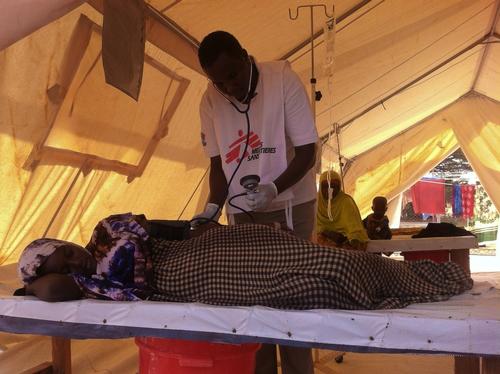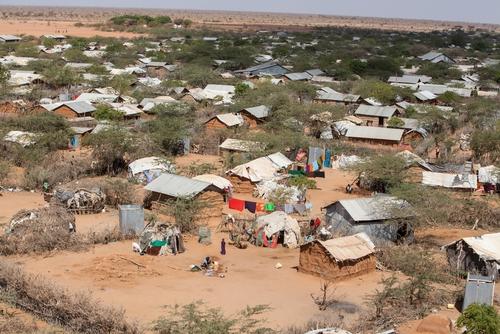Mandera County in Kenya’s North Eastern Region is the latest county to be affected by a cholera outbreak that has been ongoing in the country for approximately 17 months. Since April, almost 800 cases have been reported in Mandera including 11 deaths.
The outbreak is mainly concentrated in Mandera Township, home to around 90,000 people.
At the same time, an outbreak of the mosquito-borne disease chikungunya is placing further pressure on already stretched health services. There are an estimated 260 suspected cases according to the Ministry of Health, seven of which have been confirmed by laboratory tests. Several health staff are among those affected.
Mandera Referral Hospital has been quickly overwhelmed with cholera patients, and teams from Médecins Sans Frontières (MSF) are now urgently supporting the Ministry of Health to respond. MSF has constructed an 80-bed cholera treatment centre in the grounds of the hospital which started receiving patients yesterday.

This is the sixth time in the past six months that MSF has deployed teams to assist with cholera outbreaks in the North Eastern Region. “The fact that cholera outbreaks are recurring in this region shows that a greater response is required at both local and national levels,” says Liesbeth Aelbrecht, Head of Mission for MSF. “Mandera is the latest in a long line of examples of the lack of investment in proper water and sanitation for the population. Without an urgent and sustained improvement in living conditions, cholera will only keep spreading.”
The fact that cholera outbreaks are recurring in this region shows that a greater response is required at both local and national levelsLiesbeth Aelbrecht, Head of Mission for MSF
MSF is also urging that additional support is provided for health education activities. “We are extremely worried about the rapid spread of this outbreak,” continues Aelbrecht. “Cholera can be treated quickly and effectively if caught in time. An urgent joint effort is required by the Kenyan Ministry of Health and aid organisations with expertise in cholera response to implement effective education and prevention measures.”
Chikungunya outbreak compounding the cholera emergency
An outbreak of chikungunya - a mosquito-borne disease causing symptoms such as high fever, joint pain, rash and headache – is adding pressure to the cholera response. MSF is concerned that already overburdened health facilities will struggle, particularly as it is estimated that around half of the health staff have been affected by the disease.
Chikungunya is a viral disease transmitted by infected mosquitoes including Aedes aegypti and Aedes albopictus. Symptoms can last for two to three days. Although the disease is rarely fatal, the virus remains in the human system for five to seven days and mosquitoes feeding on an infected person during this period can also become infected.
MSF is sending additional medical staff to help in assessing and monitoring the outbreak, and to support the Ministry of Health in providing outpatient care to chikungunya patients at Mandera Referral Hospital.
MSF arrived in Mandera to assist the Ministry of Health on 20 May 2016. Medical and logistical staff have been deployed from Nairobi and from nearby Dagahaley, one of the five camps that make up the Dadaab refugee complex.
Since the cholera outbreak began in Kenya in late 2014, the Ministry of Health has reported over 15,000 cases countrywide. MSF has been working in collaboration with the Ministry of Health in 17 of the 22 affected counties supporting patient care and epidemic control measures.



